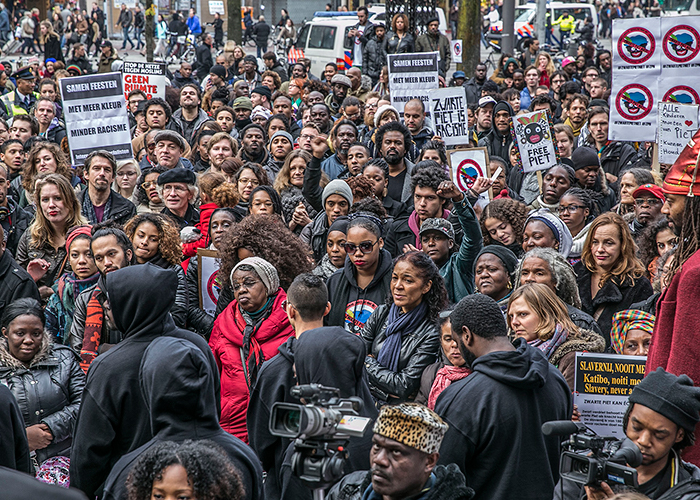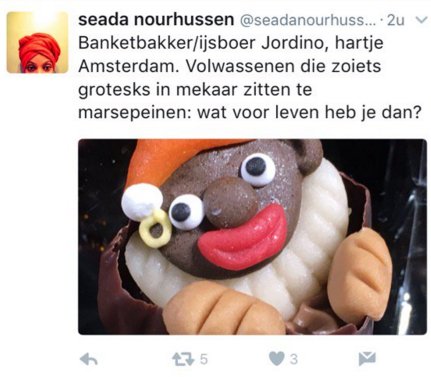The Netherlands: Journalists face threats in heated Black Pete racism debate
[vc_row][vc_column][vc_column_text]

Demonstrators voicing their opposition in 2013 (stopblackface.com)
Volkskrant columnist Harriet Duurvoort had received threats before. She often questioned the racist elements of Black Pete (Zwarte Piet) in her columns. Black Pete, a black-faced children’s character, is part of the annual Dutch feast of Saint Nicolas (Sinterklaas) celebrated every 5 December.
The threats usually came through social media. But this time it was different.
It was early December 2015. Her phone rang. There was a male voice on the other end of the line. Before she could ask who he was and how he got her number, the man started shouting at her. He called her a “bitch” and told her to keep her hands off of “our Black Pete”. His rant lasted less than a minute, Duurvoort recalled. “It was terrifying,” she said. “This wasn’t just Facebook or Twitter. This man got hold of my personal phone number, and made an effort to phone me up.”
Duurvoort’s weekly column runs in one of the biggest Dutch dailies, De Volkskrant. That week she had published a commentary for the New York Times – titled Why I changed my mind about Black Pete – in which she described how she experienced Black Pete as a child of Suriname descent. Duurvoort knew her article would stir tension and it was shared widely on social media. “It defines the climate surrounding the Black Pete debate in which we find ourselves,” she said.
For years the character of Black Pete has been causing heated debates in The Netherlands. An activist group collectively using the slogan “Black Pete is racist” began campaigning in 2011. The group aims to change the Dutch perspective on the black-faced character with which Dutch kids had been growing up for decades. But the pledge to change the Black Pete tradition has met with much resistance. Many Dutch citizens consider Black Pete an essential part of their culture and childhood memories and they don’t want to see it changed.
The United Nations committee on the Elimination of Racial Discrimination urged The Netherlands in 2015 to get rid Black Pete because it has racist elements. “Black Pete is sometimes portrayed in a manner that reflects negative stereotypes of people of African descent and is experienced by many people of African descent as a vestige of slavery,” their report stated. The UN urged the Dutch authorities to work on the elimination of racial stereotyping.
A few Dutch cities, schools and TV broadcasters have already reinvented Black Pete by changing the character’s colour and removing it’s big red lips and golden earrings, calling it Pete instead of Black Pete. But the public debate remains fierce. Protest groups in favour of and against Black Pete have clashed on several occasions. People who speak out in the media about the racist elements of the character are increasingly facing threats from Black Pete supporters, mostly through social media.
The well known TV presenter and now politician Sylvana Simons has been subject to a storm of threats ever since she became publicly vocal about Black Pete and racism. A photo-montage of her face in a video showing lynched bodies was shared on social media earlier this year. A popular radio DJ played monkey sounds on his national radio show, saying that Simons should “be quiet,” which created a huge row in Dutch media.
In November this year, the Dutch special Children’s Ombudsman, Margrite Kalverboer, received dozens of death threats by email after she’d published a report on the matter, stating that the Dutch must change the Black Pete tradition because it contributes to bullying and discrimination of black children.
Journalists experience similar threats when writing or tweeting their opinions about Black Pete. Seada Nourhussen, a Dutch-Ethiopian journalist for daily Trouw, saw her Twitter timeline fill up with roughly a hundred hate tweets after she’d posted a photo of little black-faced marzipan pastries being sold at an Amsterdam bakery on 13 November 2016. “Adults who bake these, what kind of a life do they have?” she wrote below a picture she had received from a friend.
“I’m a columnist in a free country without censorship where tensions do sometimes rise high. It’s not easy sometimes”
“It was a nasty, violent, sexsist, racist and Islamophobic mayhem,” she told Mapping Media Freedom. “My whole timeline was filled with mostly angry white men who wished me dead and called me names.” Nourhussen spent hours on blocking and reporting accounts from people who’d threatened her to Twitter. “It lasted for about a week, every day, and then it stopped”, she said. She said she also reached out to Twitter and the police, but neither responded to her.
The hate storm against her started after right-wing politician Martin Bosma (PVV) had reposted a screenshot of her tweet to his thousands of followers. Nourhussen had by then already deleted the tweet. She didn’t want to derail the racism debate towards Dutch bakeries, she said. The popular right-wing weblog GeenStijl republished Bosman’s screenshot in a tendentious article about another bakery in Amsterdam which removed black-faced cakes after someone had sprayed ‘You are racist’ on it’s window, indirectly blaming Nourhussen for it.

Nourhussen is an Africa-editor at Trouw’s foreign news desk. She does not write about the Black Pete controversy for the newspaper and her tweets represent her personal opinion. But she does think being a journalist might make her an easier target for people who are intended to send out hate tweets. “When you have my profession, and also belong to a minority group in a western country, and on top of that being a woman and having an Arabic sounding name, you’re aware that you’re not entitled to express your opinion without consequences”, she said.
It didn’t change the way she writes or tweets, she added. “I’m not afraid,” she said. “Angry is a better description of how I feel”. Nourhussen is disappointed in her colleague journalists at other newspapers and broadcasters who ran the story about her tweet only from the perspective of victimising bakeries that are selling Black Pete pastries, like daily Telegraaf and regional Amsterdam broadcaster AT5. “I’m ashamed to call those reporters my colleagues because they did a terrible job”.
Nourhussen and Duurvoort are not the only ones. The African-American documentary filmmaker Roger Williams who produced the documentary Blackface: Dutch holiday tradition or racism? for CNN in November 2015, also received death threats from Dutch citizens. “I clearly touched a nerve here,” he said in the Dutch TV talkshow RTL Late Night. Among other things he was called “black ape” in emails he’d received. He said that he was astonished by the reactions to his documentary about Black Pete and racism in The Netherlands. “The Dutch are clearly not aware that the black community in The Netherlands is not happy with Black Pete,” he said.
Several incidents with journalists have taken place during Black Pete street protests this year. On 12 November 2016 a reporter for the broadcaster PowNed, Dennis Schouten, was assaulted during a demonstration against organised by activist group Kick Out Zwarte Piet (Kick out Black Pete). Schouten was interviewing protesters when one of them, an anti-Black Pete protester, pushed him onto a moving car. He wasn’t injured and the perpetrator was arrested.
On 26 November Dutch-American journalist Kevin P Roberson was assaulted while reporting on another demonstration against Black Pete in the city of Utrecht. Roberson, owner of the online news portal The Roberson Report, was hit on the head by a Black Pete supporter while he was filming the protest. Roberson had been threatened before, and he’s told Mapping Media Freedom that he fears for his safety. He said that his home address and car license plate number is circulating on right-wing social media groups. “I don’t feel safe anymore,” he added. “I don’t know if I’d risk covering another Black Pete protest to be honest.”
The Dutch Union for Journalists condemned both attacks.
The day that Volkskrant columnist Duurvoort received that threatening phone call, she felt unsafe in her own house. At the time, she contacted the police, but they had told her there was not enough information to start an investigation. A year later she’d rather not think about it too much anymore. And it did not stop her from writing about the controversy surrounding Black Pete.
“I’m a columnist in a free country without censorship where tensions do sometimes rise high. It’s not easy sometimes,” she said. “But it is also part of my job.”
Mapping Media Freedom
Click on the bubbles to view reports or double-click to zoom in on specific regions. The full site can be accessed at https://mappingmediafreedom.org/
[/vc_column_text][/vc_column][/vc_row][vc_row][vc_column][vc_basic_grid post_type=”post” max_items=”4″ element_width=”6″ grid_id=”vc_gid:1482144241975-569ee181-a8c8-3″ taxonomies=”6664″][/vc_column][/vc_row]
